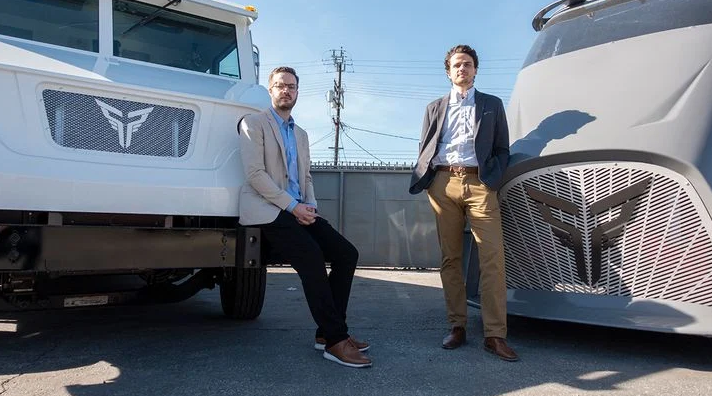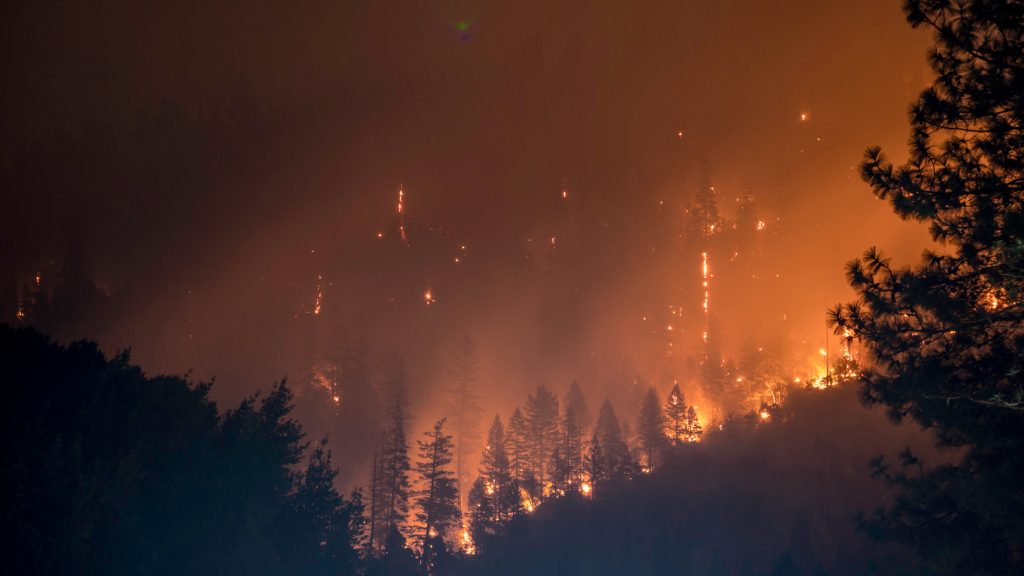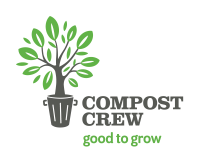To: The Impact Readers
Howdy 🤠
New Podcast Episode This Week!!!!!!
Finally got this one out, its a blast. Trust me – it’s amazing. Conversation with Aric from Envoy There which makes EVs an amenity at apartments and hotels.
Let us know what you think about the episode!
In Your Inbox: Another electric truck enters market; making sense of rolling outages in CA; an interview with Compost Crew; and an awesome podcast on EVs

Xos Trucks, a startup specializing in the field of manufacturing fully electric commercial vehicles, just announced their $20M raise. Xos Trucks is developing cutting edge technologies and mobility solutions that exceed anything on the present market.
Why does this matter?
What’s next?
Sign up for The Impact and learn the perspectives behind the latest sustainability trends

If you are in California an in an affected zone – I hope you and yours are healthy and well. 2020 really is a tough year.
Wildfires paired with rolling blackouts being reinstated for the first time in decades and aggressive weather patterns are making the grid and resilience a thing of the past. The grid is beginning to show its age – especially in California.
The rolling blackouts were claimed to have been both for power safety, but also because of capacity based issues. This claim that capacity was the issue was being challenged by “experts” that monitor and watch the grid – claiming that capacity wasn’t the issue but a grid management issue that caused the need for the outages.
Regardless most of the reporting around the outages were mostly stating large generic numbers on available capacity as opposed to deep dives into what power was actually accessible to the utility during the heat waves that occurred.
Was capacity an issue?
Well we can’t answer that directly as getting access to PG&E data is another nightmare in it of itself – but we can provide insight in why both sides make sense.
A Political Focused Rolling Outage Strategy
Now this side is full of the people who believe capacity issues weren’t a concern at all and that there was more than enough to keep operating. If this situation is true this may have been a joint strategy to push back on the aggressive solar & storage mandates that have been set forward by the state.
Infrastructure is expensive and utilities naturally want to save that capital for as long as possible. The heat waves and highly aggressive climate in CA might have been the perfect storm where enough stress was on the grid to run an outage.
We don’t believe this was the case, but it provides an argument as to why – if the utility had enough capacity – the rolling blackouts were put in place.
Infrastructure Can’t Take Advantage of DERs Today
The positive news out of all this is that organizations are now pushing hard to deploy more solar & storage across the state. Much like the Grid Alternatives and Sunrun partnership.
Now with many homes having solar it makes grid energy management significantly harder. DERMs providers like Autogrid are attempting to simplify this, but naturally a grid isn’t easy to operate especially across millions of homes. California holding the largest saturation of solar on rooftops in the states makes this even more complex for C-ISO utilities.
What we believe happened is a mix of energy management complexity with these DERs paired with high heat on the grid forced the utility and the C-ISO to make the tough decision to move to rolling blackouts to ensure no major infrastructure damage occurred.
Regardless, this shows that in the years to come – as we transition to a fully renewable grid – resilience is going to be a challenge for the grid to deal with.

This week, I talked with Ben Parry, the CEO of Compost Crew. Compost Crew provides curbside compost collection for thousands of homes in Maryland, Northern Virginia and D.C. and helps many areas businesses to recycle their organic waste. Compost Crew was founded in 2011, and today is the leading composting company in the Mid-Atlantic. As Compost Crew is focused on recycling organics, this conversation frames the main solution when it comes to food waste and how to implement behavior and policy change.
Can you describe what your company does?
We help recycle organic material – that’s material that used to be alive in some form – as Earth intended. We want to make organics recycling accessible to everyone. We do that by providing clean, convenient and affordable composting services to thousands of homes, businesses, and organizations in Maryland, DC, and Virginia. We collect food scraps and other organic material and transport it to a local facility where it becomes compost. The compost is then either returned to our customers, used at a local farm, or sold.
Customers save money on their trash bills while protecting the environment.
We serve homes, businesses, and government organizations. Many customers are individual homes, but an increasing number of neighborhoods are forming groups to sign up in bulk, which allows us to provide steep discounts from our regular price. Local governments are also teaming up with us to provide curbside collection or drop off programs for their residents. Commercial customers include various types of organizations that generate food waste and want to start recycling that food waste instead of sending it to a landfill or incinerator.
What is the current ecosystem/market landscape and who are the main players?
Composting is mainly driven by strong regional players. Compost Crew and other businesses have been fighting for about 10 years to expand organics recycling in the D.C. metro region, where there is no organic waste mandate or ban.
There’s relatively more business happening where these waste bans are in effect, but in general there’s a lot of activity across the nation. Composting can be done at a very large scale or a very small scale – you can compost at a large industrial facility or you can compost in your backyard. Because of that, a wide range of businesses and organizations are advancing composting and food scrap recycling. Together with our competitors, who are also our collaborators and friends, we are only capturing a fraction of available food waste. We have a long way to go, but there is a healthy ecosystem.
We are only capturing a fraction of available food waste because most people are not aware of the benefits or are not ready to change habits, since most have been taught to scrap leftovers into the trash can. We have a team of people publishing content and talking to people about our mission to eliminate food waste and revitalize our soils, and how people can take part in that. We can only do so much because we are a small business, so we need more governments to help with education and outreach.
We have people collecting food waste, and we are helping set up infrastructure where we can take the food waste to turn it into compost. All of these pieces, and the many organizations across the nation doing similar work, are actively working to make organics recycling commonplace.
How are you thinking about the market and policy?
As I learned from one of my colleagues in the industry, policies need to focus on four key areas: education, financial incentives, infrastructure, and enforcement.
One specific area where policies can help is increasing the cost of throwing away trash. The full cost of throwing away trash is not passed on to people and businesses that generate the trash. Local jurisdictions usually don’t incentivize people to save money to reduce the amount of trash they generate. Costs are typically spread evenly across the board via tax bills, regardless of how much trash you generate. According to a recent report, the District of Columbia spent over 54 million in taxpayer dollars since 2010 by undercharging private trash haulers – that’s a lot of money that could have gone towards advancing organics, recycling, and composting.
The other area policies can help are decreasing the cost of recycling food waste and composting. We need many more communities, local governments, and businesses to collaborate on education and outreach. This will increase demand for composting services, and that increased demand will continue to drive down the cost.
Along the same lines, state and local governments need to rethink local zoning and solid waste
regulations. Right now, many local regulations make it difficult and risky to set up compost facilities.
Finally, mandates to force waste generators to prevent or recycle food waste are gaining traction. This could be a way to rapidly accelerate the move to recycling organics.
What does the future look like?
Composting is the way of the future. It is rapidly being adopted as people realize it makes no sense to throw valuable organic nutrients in landfills that poison our air and water. We need to capture those organic nutrients to revitalize the health of our soil, which is rapidly degrading.
Composting is a natural process. So in some ways, we want to remind people that we don’t need to recreate the wheel to solve our problems. Mother Earth has already solved the problem eons ago. What we want to do is harness the natural process and help make it more efficient to keep up with our fast pace of life. In that sense, the biggest advancement we can make is to help humans realize that recycling organic waste as nature intended should be a common practice for everyone.
To do that, we need governments, businesses, nonprofits, and the public to collaborate now. Regulation, financial incentives, and education programs are all efforts that need to be expanded – people need to realize the importance of diverting organic waste from landfills and recycling it.
There are economic and environmental benefits of recycling organics. When organic waste is sent to landfills, it pollutes our air – it creates methane emissions, and when it’s sent to incinerators, it becomes toxic ash. There are very real environmental and health costs to not properly disposing of or recycling organic material.
These costs are being passed down to everybody. We will continue fighting to reverse that trend.
Our Outlook
No matter what innovations happen along the supply chain, food waste will remain an issue. Compost Crew operates in this space as a solution to this ongoing problem. Education and policy will ultimately lead the way to moving the needle on reducing food waste.
Aric is the CEO/Founder of Envoy There a startup making Electric Vehicles an amenity. Ian Sumner sits downs with Aric to learn about how car sharing can be ingrained into American Culture.
Check out and subscribe to our Youtube Channel for future episodes!
Writers: Swarnav S Pujari, Ian Sumner, Daniel Kriozere
If you aren’t absolutely thrilled with The Impact, reply and let us know why. Or you can unsubscribe from all updates by clicking here.
Copyright © The Impact 2020. All Rights Reserved || 19 Morris Ave, Bldg 128, Brooklyn NY 11205
Develop your market map of up-and-coming climate startups and market opportunities by subscribing to our weekly newsletter for free.